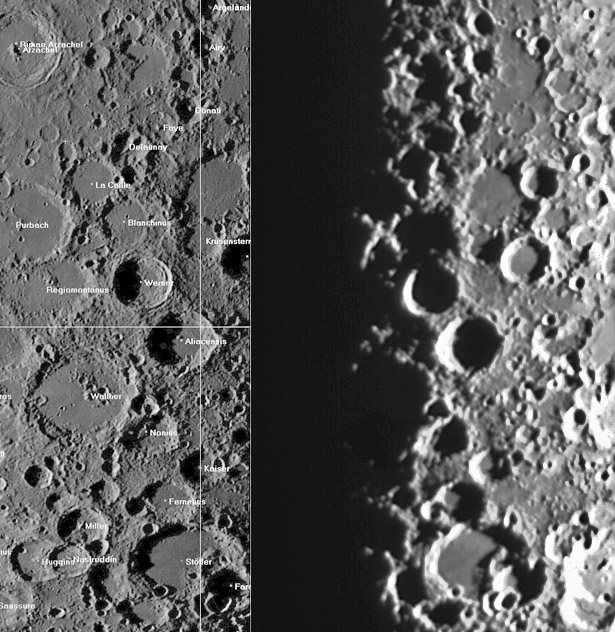Difference between revisions of "January 8, 2010"
| Line 6: | Line 6: | ||
<em>image by [mailto:walker3139@gmail.com Tom Walker], Vero Beach, FL</em><br /> | <em>image by [mailto:walker3139@gmail.com Tom Walker], Vero Beach, FL</em><br /> | ||
<br /> | <br /> | ||
| − | Shakespeare called Romeo and Juliet star-crossed because there was no hope for their love. Being Moon-crossed is not a commonly recognized condition (and isn't fatal) but it appears to mean being obsessed with seeing crosses along the terminator. Perhaps Tom is not obsessed, but he was pleasantly surprised to stumble upon one of the well-known crosses. Matching his image with sheets 55 and 65 from Jim Mosher's image [ | + | Shakespeare called Romeo and Juliet star-crossed because there was no hope for their love. Being Moon-crossed is not a commonly recognized condition (and isn't fatal) but it appears to mean being obsessed with seeing crosses along the terminator. Perhaps Tom is not obsessed, but he was pleasantly surprised to stumble upon one of the well-known crosses. Matching his image with sheets 55 and 65 from Jim Mosher's image [https://the-moon.us/wiki/R%C3%BCkl+Index+Map version] of Rükl's <em>Atlas</em> provides locational information. The cross is easy to find, if the terminator is <em>crossing</em> it, because it continues on a line from Aliacensis past Werrner. The cross is a <em>[https://the-moon.us/wiki/clair-obscur clair obscur]</em> phenomena that can occur where ever two crater rims touch on an east-west line. Here the rims of Blanchinus and Purbach are reinforced to the north with La Caille, and Purbach's east rim has a high bump to help define the cross's center. Recognizing this cross does nothing to help understand the geology of the Moon, but it is a delight to see, especially if accidently observed.<br /> |
<br /> | <br /> | ||
<em>[mailto:tychocrater@yahoo.com Chuck Wood]</em><br /> | <em>[mailto:tychocrater@yahoo.com Chuck Wood]</em><br /> | ||
| Line 14: | Line 14: | ||
<br /> | <br /> | ||
<strong>Related Links</strong><br /> | <strong>Related Links</strong><br /> | ||
| − | Rükl plate [ | + | Rükl plate [https://the-moon.us/wiki/R%C3%BCkl+55 55]<br /> |
| − | All the info about this [ | + | All the info about this [https://the-moon.us/wiki/Lunar+X X]<br /> |
<br /> | <br /> | ||
<p><b>Yesterday's LPOD:</b> [[January 7, 2010|Ridges And Patches]] </p> | <p><b>Yesterday's LPOD:</b> [[January 7, 2010|Ridges And Patches]] </p> | ||
Revision as of 18:20, 18 August 2018
Moon-Crossed

image by Tom Walker, Vero Beach, FL
Shakespeare called Romeo and Juliet star-crossed because there was no hope for their love. Being Moon-crossed is not a commonly recognized condition (and isn't fatal) but it appears to mean being obsessed with seeing crosses along the terminator. Perhaps Tom is not obsessed, but he was pleasantly surprised to stumble upon one of the well-known crosses. Matching his image with sheets 55 and 65 from Jim Mosher's image version of Rükl's Atlas provides locational information. The cross is easy to find, if the terminator is crossing it, because it continues on a line from Aliacensis past Werrner. The cross is a clair obscur phenomena that can occur where ever two crater rims touch on an east-west line. Here the rims of Blanchinus and Purbach are reinforced to the north with La Caille, and Purbach's east rim has a high bump to help define the cross's center. Recognizing this cross does nothing to help understand the geology of the Moon, but it is a delight to see, especially if accidently observed.
Chuck Wood
Technical Details
Dec 23, 2009 at 20:19 EST (2009 Dec 24 01:19 UT). LX200 OTA 10"/f6.3 on a CGEM + Orion SSPIAG camera. Image was stacked and processed in Registax 5 (15 of 100).
Related Links
Rükl plate 55
All the info about this X
Yesterday's LPOD: Ridges And Patches
Tomorrow's LPOD: Cx35
COMMENTS?
Register, Log in, and join in the comments.



